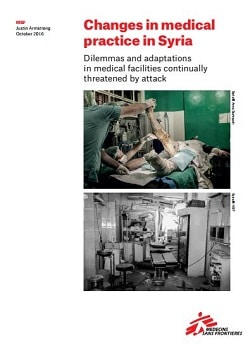Dilemmas and adaptations in medical facilities continually threatened by attacks
 The frail situation in Syria as a result of the war including attacks and the ever-present threat of attacks not only deny the population access to medical facilities but also affect the scope and effectiveness of the medical care that still can be provided. The report seeks to detail some of the ways in which the provision of medical care has been compromised or forced to adapt in light of security threats. While Doctors Without Borders/Médecins Sans Frontières (MSF) has been able to find ways of providing healthcare in many parts of Syria, this has not been without significant challenges.
The frail situation in Syria as a result of the war including attacks and the ever-present threat of attacks not only deny the population access to medical facilities but also affect the scope and effectiveness of the medical care that still can be provided. The report seeks to detail some of the ways in which the provision of medical care has been compromised or forced to adapt in light of security threats. While Doctors Without Borders/Médecins Sans Frontières (MSF) has been able to find ways of providing healthcare in many parts of Syria, this has not been without significant challenges.
MSF continues to struggle to directly provide, or support the provision of, critical medical care. This has also forced MSF to both question its standard intervention models and concurrently find ways to adapt its operations and medical practices to the brutal reality of the Syrian conflict. Where facilities continue to operate, the range of medical services offered has been drastically diminished, at a time when there has been a surge in medical needs, particularly acute trauma care. Non-emergency services are now scarce, turning previously avoidable and treatable health issues into life-threatening illnesses. MSF continues to pursue further adaptations – decentralised care enabled by technologies, more remote support, amongst others- to try to deliver medical care as best as possible under the circumstances. Some of these current and future adaptations can genuinely improve the quality of and access to care, while others sadly reflect the harsh limitations of what can be done for populations living within a conflict.
Download report “Changes in medical practice” (PDF)












